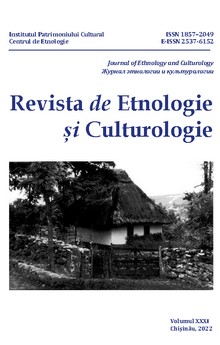ROMANIAN HARNIC ‘INDUSTRIOUS, HARDWORKING’ AS A KEY TO THE ETYMOLOGY OF THE UKRAINIAN ГАРНИЙ ‘BEAUTIFUL, GOOD’
THE ROMANIAN HARNIC ‘INDUSTRIOUS, HARDWORKING’ AS A KEY TO THE ETYMOLOGY OF THE UKRAINIAN ГАРНИЙ ‘BEAUTIFUL, GOOD’
Author(s): Aleksey A. RomanchukSubject(s): Phonetics / Phonology, Lexis, Semantics, Comparative Linguistics, Eastern Slavic Languages
Published by: Institutul Patrimoniului Cultural al Academiei de Științe a Moldovei
Keywords: Romanians; Ukrainians; interethnic; linguistic; interactions;
Summary/Abstract: The author suggests a new etymology of the Ukrainian гарний ‘beautiful, good’ and the Romanian harnic ‘industrious, hardworking’. He thinks that a Slavic (of the Proto-Slavic time) verb with the meaning ‘to work hard’ was the source of both mentioned lexeme. The existence of this verb is supported by the Ukrainian dialectal [гарувати] with the same meaning, which has direct analogies both in East Slavic, some West Slavic and South Slavic (Serbian, Slovenian) languages. The origin of this Slavic verb can be explained through the analysis of two other Ukrainian dialectal words that are semantically close to each other, but differing in phonetics and, as some researchers believe, according to origin. The mentioned words are [гара] и [ґара], with the meaning ‘a cart with a box for transporting earth or sand; a sledge for transporting large loads’. Since in this case there is an indisputable semantic identity of both forms (practically identical phonetically as well), we cannot, contrary to the versions expressed earlier, separate from each other the question of their origin. The phonetic difference has to be explained by the difference in the time of the borrowing. Thus, the author thinks that the for-Slavic verb, which became the source for the Ukrainian [гарувати], гарний (as well as [гарник] ‘cart worker’), and the Romanian harnic, came from a word borrowed during the Proto-Slavic time with the meaning ‚cart’. However, contrary to the previous opinion, the author thinks that this borrowed word comes not from the German Karre ‘kart, wheelbarrow’, but from the Romanian car ‚cart‘.
Journal: Revista de Etnologie şi Culturologie
- Issue Year: XXXI/2022
- Issue No: 1
- Page Range: 124-128
- Page Count: 5
- Language: English

